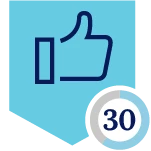Netskope Global Technical Success (GTS)
Can't Access Sponsored Websites with Netskope? Let's Explore Why
Netskope Cloud Version - 129
Objective
In some cases, users at customer's end may find themselves unable to access sponsored websites while using Netskope.
Prerequisite
Netskope SWG or Next-Gen SWG license
Context
End-users may report being unable to access Google sponsored results. This article provides detailed information related to this issue.
Do You Know?
- What Are Sponsored Websites?
Sponsored websites are paid advertisements that appear in search engine results or on web pages. These sites are promoted by advertisers to increase visibility and traffic.
Ref.
As part of testing, I searched for "Online PDF Reader" using the Google Chrome browser. The results are shown below -
Top 2 results are sponsored
- Lets understand Google Ads
Google Ads (formerly AdWords) is Google’s online advertising platform that allows businesses to display ads on Google search results and across the web. It uses a pay-per-click model, helping advertisers reach targeted audiences based on keywords and user behavior. In the above reference image https://www.pdffiller.com/ and https://pdfsimpli.com/ are using Google Ads service to get more traffic on their website.
Details
- Let's review the traffic redirection process. Please follow the steps below -
Step 1 - Click on a Sponsored website (Image I).
Step 2 - Review Image II, the traffic is initially redirected to https://www.google.com/aclk, which issues an HTTP 302 redirect to the destination. In the reference images below, the final redirect leads to https://www.pdffiller.com (Image III)
Image I
Image II
Image III
This URL belongs to a Netskope predefined URL category
Path: Netskope Tenant UI >>> Skope IT >>> URL Lookup
- If a Netskope customer is unable to access sponsored websites, the most common reason is the presence of a Realtime Protection Policy that blocks traffic categorized under ‘Online Ads’
Ref.
- Blocking traffic to the ‘Online Ads’ URL category is one of Netskope’s best practices, typically implemented with a ‘Mute’ notification to prevent disruptive pop-ups for end-users.
Ref.
Author Notes
- If a customer wishes to allow access to sponsored websites, they can do so by removing the ‘Online Ads’ URL category from the block policy.
- It is recommended to review -
Terms and Conditions
- All documented information undergoes testing and verification to ensure accuracy.
- In the future, it is possible that the application's functionality may be altered by the vendor. If any such changes are brought to our attention, we will promptly update the documentation to reflect them.
Notes
- This article is authored by Netskope Global Technical Success (GTS).
- For any further inquiries related to this article, please contact Netskope GTS by submitting a support case with 'Case Type – How To Questions'.







